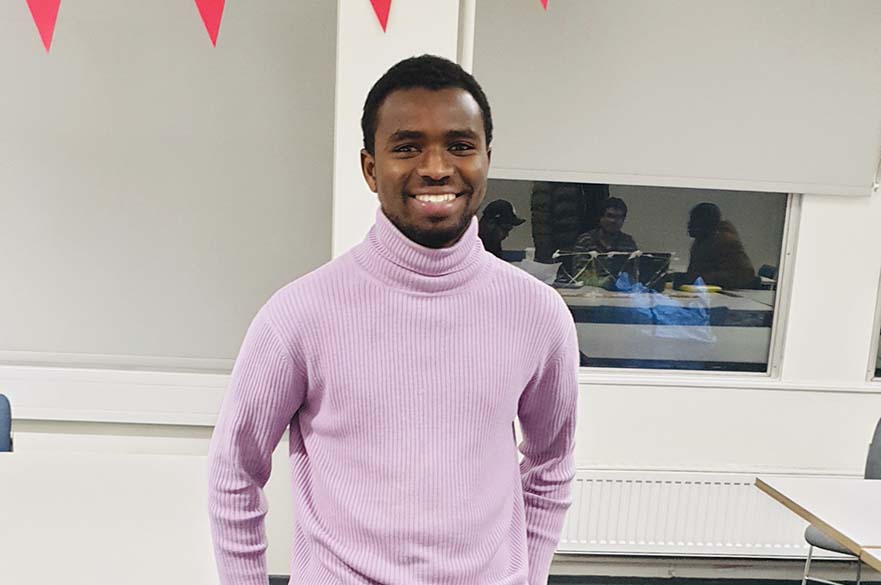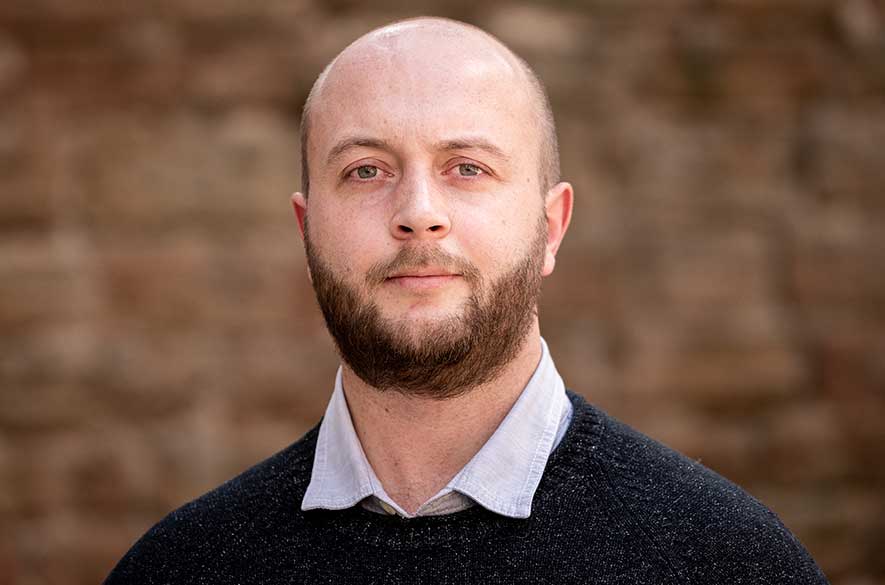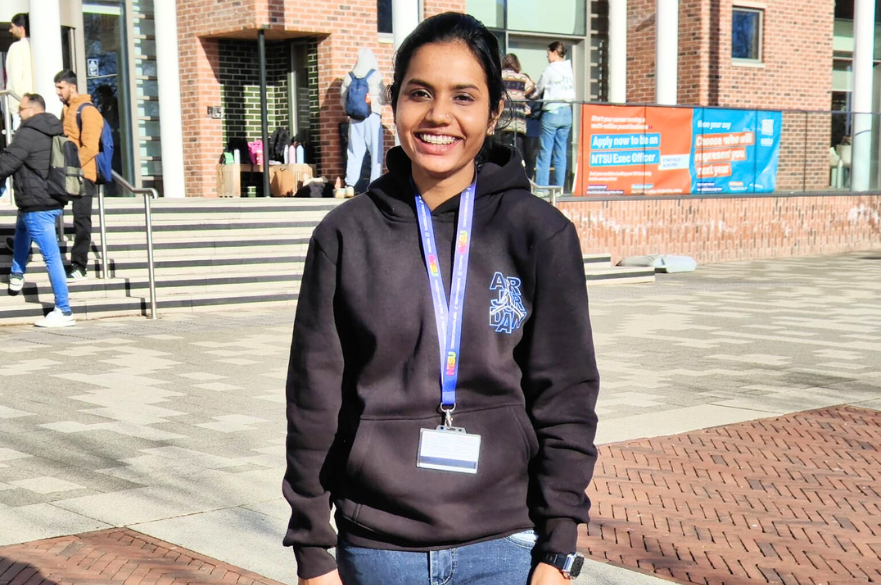More about Arya
How did you hear about your course?
Arya: Sites like Prospects.ac.uk list the course, which were helpful for me researching career options. NTU has been consistently ranked as one of the most sustainable universities globally. It was ranked 4th most sustainable university in the world by the 2020 UI Green-Metric World University Rankings. And also, this course which is designed to address the skills shortage in the growing Sustainable Energy sector.
Had you visited Nottingham Trent University before you applied here? Did you come here on an open day?
Arya: I had not visited Nottingham Trent University before applying, nor did I attend an open day. While NTU offers various opportunities for prospective students to visit and explore the campus, including undergraduate open days, campus tours, and virtual tours, I did not personally take advantage of these options prior to submitting my application.
Although I didn't visit in person, I researched the university through other means. I explored NTU's official website for detailed information about courses and facilities, and reviewed virtual tours and online resources to get a sense of the campus environment. I also read about NTU's reputation and rankings in sustainability and other relevant areas and connected with current students or alumni through online platforms.
If so, how important was the open day to your decision to study at Nottingham Trent University?
Arya: Since I did not attend an open day at Nottingham Trent University, the open day was not a factor in my decision to study there.
When you first heard about the course, what was it that particularly appealed to you?
Arya: When I first heard about the sustainable engineering course at Nottingham Trent University, several aspects particularly appealed to me. The course's emphasis on sustainable practices in engineering aligned perfectly with my growing interest in environmental issues and my desire to contribute to an eco-friendlier future. I was excited by the prospect of learning how to apply engineering principles to address global sustainability challenges. The program's promise of hands-on experience and practical skills development was very attractive. I believed this would be crucial for my future career in the field and would give me a competitive edge in the job market. The course content seemed to cover the latest developments in sustainable technologies and energy systems. This excited me as someone keen to be at the forefront of innovation in the rapidly evolving field of sustainable engineering.
What would you describe as the strengths of your course?
Arya: There are some key strengths of the sustainable engineering course at Nottingham Trent University (NTU) which include: The course is designed to address the skills shortage in the growing Sustainable Energy sector, preparing students for diverse roles in the move towards clean energy generation, distribution, and consumption. NTU's engineering courses emphasize hands-on experience and problem-solving through project work. This practical focus helps students develop skills that are directly applicable in the industry. Students have access to a wide range of equipment, including 3D printers, hydraulic rigs, structural testing machines, and Formula 1 simulators. This exposure to modern technology enhances the learning experience. The university has strong links with industry partners, providing opportunities for internships, project work with real-world applications, and potential employment after graduation. The course benefits from a strong body of staff expertise and research in sustainable engineering. The course prepares students for a diverse set of roles and industries in the move towards sustainable energy, enhancing employability.
Can you give specific examples of topics, projects etc. covered on your course?
Arya: I can highlight some specific examples of topics and projects that are likely covered in the sustainable engineering course at Nottingham Trent University: The course focuses on clean energy generation, distribution, and consumption, covering topics such as renewable energy technologies, smart grids, and energy efficiency. Students learn how to evaluate and mitigate the environmental effects of engineering projects. The course covers how to design and implement sustainable infrastructure projects, exploring eco-friendly transportation solutions and identifying and assessing risks in engineering contexts and developing mitigation strategies.
What practical equipment do you have available to you? Please provide information about the standards of the equipment, availability, relevance to your course, etc.
Arya: NTU provides access to a wide variety of engineering equipment, including 3D printers, hydraulic rigs, structural testing machines, and Formula 1 simulators. While not all of these may be directly related to sustainable engineering, they demonstrate the university's commitment to providing industry-standard tools. The Engineering Building at NTU houses facilities for undergraduate, postgraduate, and research students. This suggests that the equipment is of high quality and up-to-date with industry standards. The equipment and facilities are designed to support practical learning and real-world problem-solving, which aligns with the course's focus on preparing students for diverse roles in sustainable energy.
What skills do you feel you have learned as a result of this course and how will they help you in the future?
Arya: As a result of the Sustainable Engineering course at NTU, I've developed a range of valuable skills that I believe will be crucial for my future career. I've gained in-depth knowledge of sustainable technologies, renewable energy systems, and environmental management practices. This expertise will be essential in developing and implementing sustainable solutions in various engineering projects. The course has enhanced my ability to analyse complex sustainability challenges and develop innovative solutions. This skill will be invaluable in addressing real-world environmental issues in my future career. I've learned to use advanced software for environmental modelling and data analysis, which will be essential for assessing the impact of engineering projects and making data-driven decisions.
What has been your greatest achievement as a Nottingham Trent University student?
Arya: My greatest achievement as a Nottingham Trent University student was receiving the EROS scholarship. The EROS program offers an opportunity to work alongside leading academics and technical staff on research projects. This hands-on research experience is highly valuable for my academic and professional development. The scholarship allows me to delve deeper into specific areas of engineering that interest me and potentially help shape my future career path.
In what way are you supported by the academic staff in your faculty?
Arya: Academic staff, including professors and lecturers, provide expert guidance and mentorship to help me to navigate my academic journey. This includes offering advice on coursework, research projects, and career paths. Faculty members often provide career advice and help students connect their studies to future career opportunities. This can include facilitating internships, networking opportunities, and industry connections. NTU has dedicated Learning and Teaching Librarians who support students with research and academic skills. They provide resources and guidance tailored to specific disciplines.
Are you aware of the central support services in place at Nottingham Trent University and how valuable have you found them to be?
Arya: Yes, NTU likely offers academic skills support, such as writing workshops, study skills sessions, and one-on-one tutoring. The university probably has a career center to help students with job searches, resume writing, and interview preparation. The search results mention various scholarships and bursaries available to students, indicating that financial support services are in place. While not a central university service, the Student Union often provides various forms of support and representation for students.
What do you enjoy or value about studying at Nottingham Trent University?
Arya: From traditional engineering disciplines to innovative programs in sustainable engineering, NTU offers a wide range of courses to suit different interests and career goals. The university offers various scholarships and bursaries to support students financially. NTU has a strong research focus, allowing students to engage in meaningful research projects alongside expert staff. The university provides various support services, including academic support, career services, and personal tutoring. With multiple campuses in Nottingham and a new campus in London, students can enjoy the benefits of studying in vibrant city environments.
What are your career plans?
Arya: My career plans are focused on advancing research and knowledge in the field of sustainable engineering through pursuing a PhD. After completing my current degree, I aim to apply to top universities with strong research programs in sustainable engineering. I'm particularly interested in programs that offer interdisciplinary approaches, combining engineering with environmental science, policy, and economics. During my PhD, I intend to specialize in an area such as renewable energy systems, sustainable urban infrastructure, or circular economy engineering. This will allow me to contribute new knowledge to a critical aspect of sustainable development.
Have they changed as a result of your degree?
Arya: Yes, my career plans have evolved significantly as a result of my degree in sustainable engineering at Nottingham Trent University. The program has broadened my perspective and opened up new possibilities I hadn't previously considered.
Is there anything else you would like to say that you feel might be relevant to someone thinking about enrolling on your course?
Arya: If you're considering enrolling in the sustainable engineering course at Nottingham Trent University, there are a few additional points I'd like to highlight that might be relevant to your decision. NTU places a strong emphasis on practical, hands-on learning. You'll have access to a wide range of equipment and facilities, including 3D printers, hydraulic rigs, and specialized labs. This practical focus really helps in developing skills that are directly applicable in the industry. The course is designed to develop problem-solving skills through project work. This approach prepares you well for real-world challenges in the field of sustainable engineering.
Still need help?
-

STUDENT PROFILE
Adam Ado Sabari
Civil EngineeringNigeria
https://www.ntu.ac.uk/study-and-courses/courses/our-students-stories/architecture-design-built-environment/adam-ado-sabari
-

STUDENT PROFILE
Aseel Al Shawakri
Structural Engineering with ManagementJordan
https://www.ntu.ac.uk/study-and-courses/courses/our-students-stories/architecture-design-built-environment/aseel-al-shawakri
-

STUDENT PROFILE
Craig J. Gregory
Digital Architecture and ConstructionUnited Kingdom
https://www.ntu.ac.uk/study-and-courses/courses/our-students-stories/architecture-design-built-environment/craig-j.-gregory
